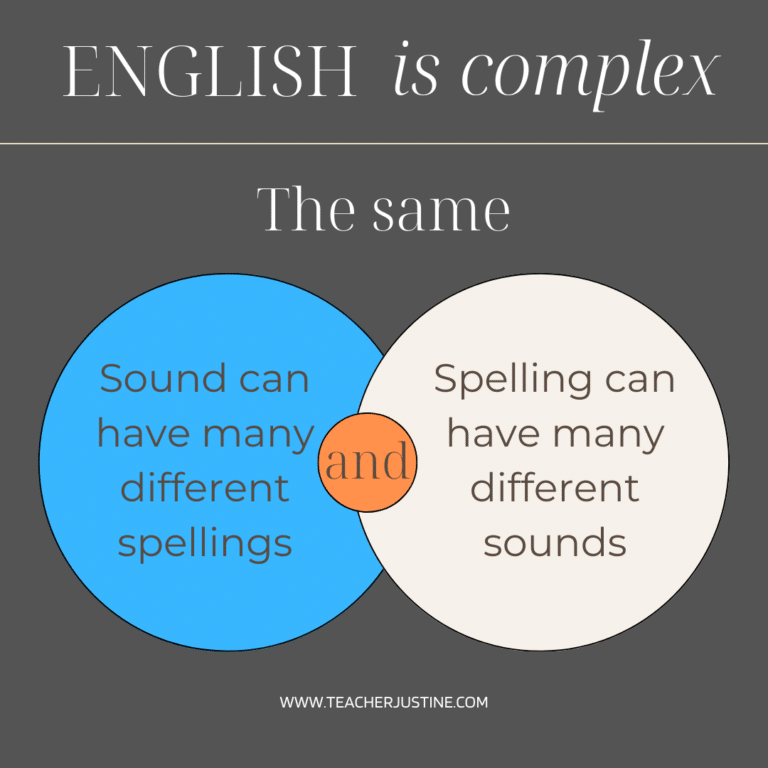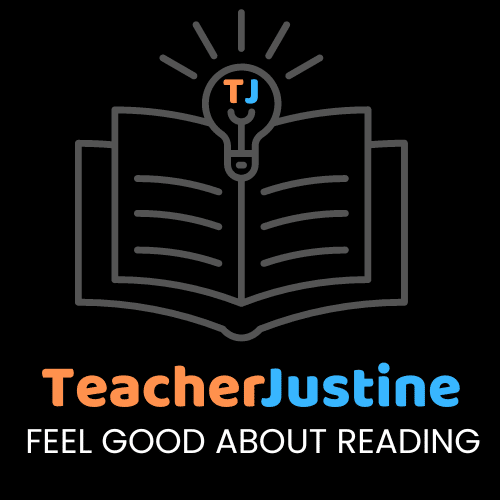Teacher Justine contains affiliate links and is a member of the Amazon Services LLS Associates Program. If you make a purchase using one of these Amazon links, I may receive compensation at no extra charge to you. See my disclosure policy for more information.
What Does a Reading Tutor Do?
Find out what a reading tutor does and why your child needs one
The other day a friend of mine asked me, “What does a reading tutor do?”. My friend is also a teacher, so this might seem like a strange question. But since she is Italian, this is a perfectly logical question.
English, unlike Italian, is a complex code. To teach children to read accurately in English, it is important to teach the code in a systematic way.
This is because, in English, the same sound can have many different spellings. And the same spelling can have different sounds.
Think of all the different spellings for the long e sound:
ee (beef), ea (meat), ie (thief), y (silly), i (medium), e (me), ey (key), ei (receive).
And think of all the sounds for the spelling ‘ea’: team, great, bread, heart.
In Italian, there is a 1-to-1 sound-spelling correspondence.

Learning the English code is easy for some children, challenging for most, and very difficult for others. Schools formally teach decoding in kindergarten through second grade. They do this through whole -class instruction, small groups, and by sending kids out to the resource room for more help.
Even with this multi-tiered approach, there will be many kids who do not learn how to read accurately. This can do undetected and become a huge problem.
Does my child need a reading tutor?
If you suspect your child is not learning to decode and is only memorizing words in the early stages of reading, then they will benefit greatly from one-on-one instruction with a tutor.
If your child seemed to be doing fine in the early stages of reading, but is getting frustrated in third and fourth grades, then they have a reading problem with multisyllabic words. One-on-one instruction with a tutor will fix this problem.
If your upper elementary or middle school child stumbles over words, omits and inserts words, and misreads words, this problem is not going to go away on its own. A tutor can help remediate this problem with one-on-one instruction.
IF YOUR CHILD IS
Struggling with Reading
I CAN HELP
Why is my child not learning to read at school?
Learning to read means understanding that our speech is made up of sounds and that these sounds are represented by letters. This is the key to cracking the code.
For the past 20 years, most schools were using an approach that did not explicitly teach the code. Instead, they gave beginning readers books with predictable text and lots of pictures. They told the children to look at the first letter of the word and the picture and make a guess.
Since the text repeated the same sentence on each page with a different word at the end that was represented by the picture, it seemed like the children were reading. However, if you asked the children to read the same words later in a different context without the picture, they had no idea what the word was.
This method called Balanced Literacy, has recently come under attack by parents and teachers. Because of this many districts are changing their instruction for grades K-2. They are switching to phonics to teach the code. For more on this, read my blog Are Schools Teaching Reading Wrong?
Phonics is great but letters don’t talk
Teaching phonics instead of teaching children to guess words is great but can still cause problems. Many teachers tell children that letters make sounds. “B says buh.” There are two things wrong with this. The first is that letters don’t talk. They represent sounds in our speech.
The second is that “buh” has more than one sound. “Buh” is a consonant sound plus a vowel sound after it.
If a child learns that b says ‘buh’ and d says ‘duh’, then when they try to sound out the word “bed”, they will say buh-ĕ-duh. When they try to blend that together, they can’t recognize a word they know.
It is very important to clip the sounds when segmenting so the child can blend them together and recognize the word they are saying. And it is essential to teach children to isolate each sound when they are segmenting so that they can learn to spell correctly.
Some children will learn to read in schools no matter what approach is used or how it is taught. But many children will not catch on. They will resort to memorizing and guessing words and this will result in a reading problem.
Reading tutors who specialize in teaching the code in an explicit, systematic way can help fix these problems.
My child can decode but not comprehend
The purpose of reading is to understand what the author is saying. Sometimes parents tell me that their child can decode accurately but they don’t comprehend what they are reading.
When this happens, the first thing I check for is accuracy and fluency. Sometimes parents think their child can decode but they are actually guessing the multisyllabic words.
If accuracy is not the problem, then the next thing I check for is fluency. Fluency means reading with appropriate rate and phrasing. If the phrasing is off, this will interfere with comprehension.
If both accuracy and fluency are fine, then lack of comprehension probably comes from lack of interest in the text, lack of background knowledge, or difficulty with the vocabulary and syntax. If you are not interested in what you are reading, it is hard to stay focused. This happens to all of us. We read an entire page and can’t remember anything we read.
Some children are easily distracted especially at school. A tutor can help with this.
Another cause of comprehension difficulties is that some text is difficult, and you have to put effort into understanding it. Elementary and middle school students might not realize that reading is active, and you have to try to catch the meaning that the author is sending to you. This means re-reading, underlining, looking up words, and thinking.
A tutor can help with comprehension issues by teaching how to summarize, identify key words, visualizing, and asking questions.
What should I look for in a reading tutor?
There are many different kinds of tutors. Some tutors help with homework. Some tutors say they will tailor their reading program to your child’s “learning style”. Avoid this! You want a professional reading tutor who understands how to teach reading effectively.
A professional reading tutor will:
- Quickly identify your child’s gaps and weaknesses using diagnostic tests. (Isolated word recognition, nonsense word decoding, phoneme awareness, phoneme segmentation, phoneme blending, code knowledge, fluency.)
- Use these tests to develop a profile of your child in order to know where to focus the instruction and which level to start in.
- Teach your child to read correctly using a good reading method in a short space of time. Tutoring is expensive and should not go on and on forever.
- Use a good reading method that makes it clear that speech is made up of sounds and that letters represent sounds in our speech.
- Include comprehension strategies at all levels.
Ask ‘What makes you different?’
Once you identify some professional reading tutors who do the above things, ask them what sets them apart from the others. Ask to see their reviews to find out how others describe what makes them special.
If you suspect your child has a reading problem, book a free consultation with me today. You can tell me what you are noticing. Then I will perform the diagnostic tests mentioned above. After that, I will tell you how I can help and about how long it will take. Finally, I will tell you what makes me different and why my secret sauce works!
IF YOUR CHILD IS
Struggling with Reading
I CAN HELP
